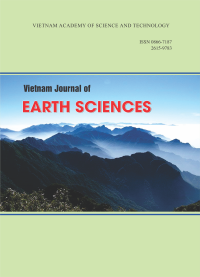RED BASALTIC SOILS-THE RAW MATERIAL SOURCE FOR PRODUCTION OF NON-CALCINED BRICK
Author affiliations
DOI:
https://doi.org/10.15625/0866-7187/36/3/5904Abstract
Red basaltic soils that widely distribute in Tay Nguyen, Central region and elsewhere in Vietnam consist mainly of gibbsite (45-50%), goethite (12-20%), kaolinite (15-17%) minerals, In red soil, the total amount of (SiO 2 + Al 2 O 3 + Fe 2 O 3 ) and colloidal content varies from 65.50 to 83.43%, and from 35 to 74% respectively, leading to high reactivity index (95-154mgCaO/g.pg).
By two different binding methods: 1/Red basaltic soils with hydrated lime; 2/ Red basaltic soils with alkali solution (NaOH) and added sodium silicate, non-calcined products made from basaltic soils have compressive strength in the range of 75-292kG/cm2 for first method and 95kG/cm2 for second one, with other physical-mechanic properties to meet the technical requirements of construction brick according to Vietnamese standards TCVN 2118-1994. Experimental results prove the feasibility of using the red basaltic soils as suitable raw materials for manufacturing non-calcined building materials.
References
Claude Boutterin and Joseph Davidovits: 1988: Réticulation Géopolymèrique (LTGS) et matériaux de construction, Geopolymer ' 88, Vol.1, pp. 79-88. (Modified and adapted with theautorisation of CORDI-Géopolymère S.A. in July 2003).
Gordon Browne, 2009: Stabilised interlocking rammed earth blocks:alternatives to cement stabilisation. Proceedings of the 11th International Conference on Non-conventional Materials and Technologies (NOCMAT 2009) 6-9 September 2009, Bath, UK.
Bùi Văn Chén, Đào Tiến Đạt: 1985: Kỹ thuật sản xuất gạch không nung, NXB Xây dựng, Hà Nội.
Ljubica Ćojbašić1, Gordana Stefanović1, Živko Sekulić2, Snežana Heckmann, 2005: Influence of the fly ash chemical composition on the portland cement and fly ash mixturehydration mechanism, Series: Mechanical Engineering Vol. 3, No 1, pp. 117 - 125
J. Davisovit 1991: Geopolymers: inorganic polymeric new materials J. Thermal Analysis, Vol. 37, pp.1633-1656.
D. Hardjito and B. V. Rangan, 2005: Development and properties of low-calcium fly ash-basedgeopolymer concrete. Curtin University of TechnologyPerth, Australia
Joseph Davidovits, 2002: 30 Years of Successes and Failures in Geopolymer Applications. Market Trends and Potential Breakthroughs. Geopolymer 2002 Conference, Melbourne, Australia.
Pre De Silva1 And Kwesi Sagoe-Crenstil, 2009: The Role of Al2O3, SiO2 and Na2O on the Amorphous → Crystalline Phase Transformation in Geopolymer Systems. Journal of the Australian Ceramic Society Volume 45, 1, pp 63-71.
Nguyễn Ánh Dương, 2011: Nguyên liệu khoáng hoạt tính từ một số thành tạo đá phun trào axít và trung tính ở việt nam và ý nghĩa thực tiễn của chúng. Tạp chí Các Khoa học về Trái Đất, 3ĐB, tr.559-605.
Qhatani Mohsen, Nasser Yosef Mostafa, 2010: Investigating the possibility of utilizing low kaolinitic clays in production of geopolymer bricks. Ceramics - Silikáty 54 (2), pp 160-168.
A.M. Mustafa Al Bakri, H. Kamarudin, M. Bnhussain, I. Khairul Nizar, A.R. Rafiza & A.M. Izzat., 2011: Chemical Reactions in the Geopolymerisation Process Using Fly Ash–Based Geopolymer: A Review, Australian Journal of Basic and Applied Sciences, 5(7), pp.1199-1203.
Patrick N. Lemougna, Uphie F. Chinje Melo, Elie Kamseu and Arlin B. Tchamba, 2011: Laterite Based Stabilized Products for Sustainable Building Applications in Tropical Countries: Review and Prospects for the Case of Cameroon. Sustainability, Vol.3(1), pp. 293-305.
Kiều Quý Nam, Nguyễn Ánh Dương, 2010: Nguyên liệu và công nghệ sản xuất vật liệu xây dựng không nung - một vài kết quả thử nghiệm. Tạp chí Địa chất, loạt A số 322 12 2010, tr.54-65.
Kiều Quý Nam, 2001: Puzơlan Việt Nam - Tiềm năng và khả năng sử dụng. Tạp chí Địa chất, Loạt A (267 11-12), tr.106-110.
Kiều Quý Nam, 2002: Mối tƣơng quan giữa thành phần hoá học, cấu trúc đá với hoạt tính puzơlan trong basalt Kainozoi tại Lâm Đồng. Tạp chí Các Khoa học về Trái Đất, T.24, 4, tr.341-347.
Kiều Quý Nam (chủ biên), 2004: Báo cáo tổng kết dự án: Ứng dụng công nghệ sản xuất vật liệu không nung. Lƣu trữ tại Viện Địa chất. 220
Kiều Quý Nam (chủ biên), 2005: Báo cáo tổng kết đề tài: Nghiên cứu, đánh giá đặc điểm, tiềm năng nguyên liệu và xây dựng quy trình công nghệ sản xuất gạch lát tự chèn không nung từ puzơlan khu vực Pleiku, Buôn Ma Thuột. Lƣu trữ tại Viện Địa chất.
Kiều Quý Nam, 2006: Nghiên cứu sử dụng puzơlan trong sản xuất vật liệu xây dựng không nung. Tạp chí Địa chất, Loạt A (293/3-4), tr.16-24.






